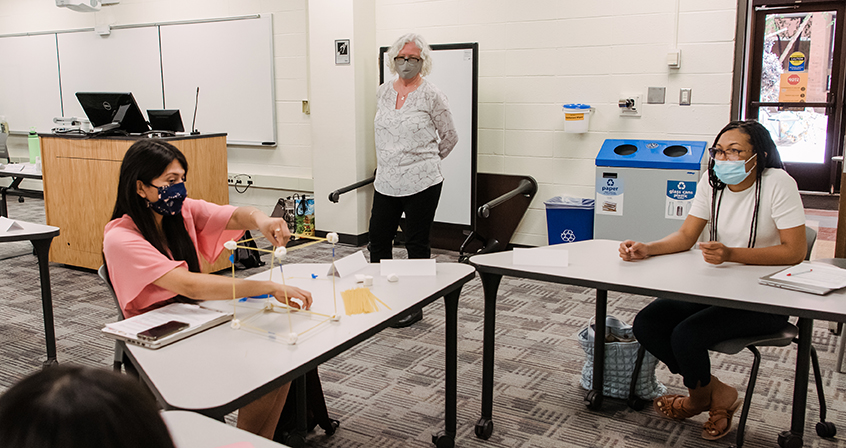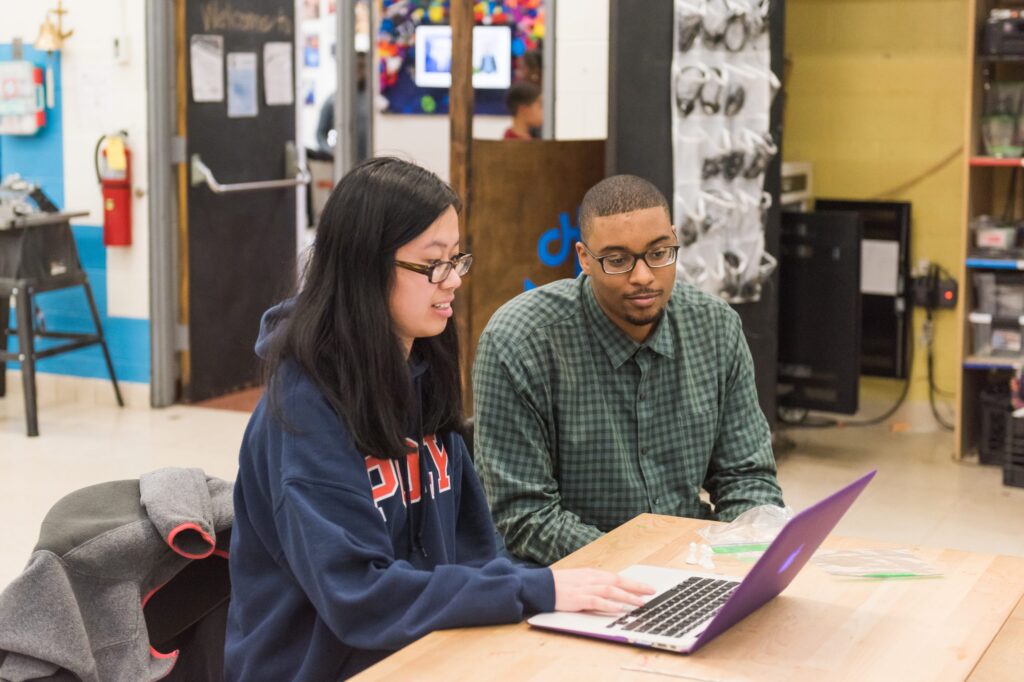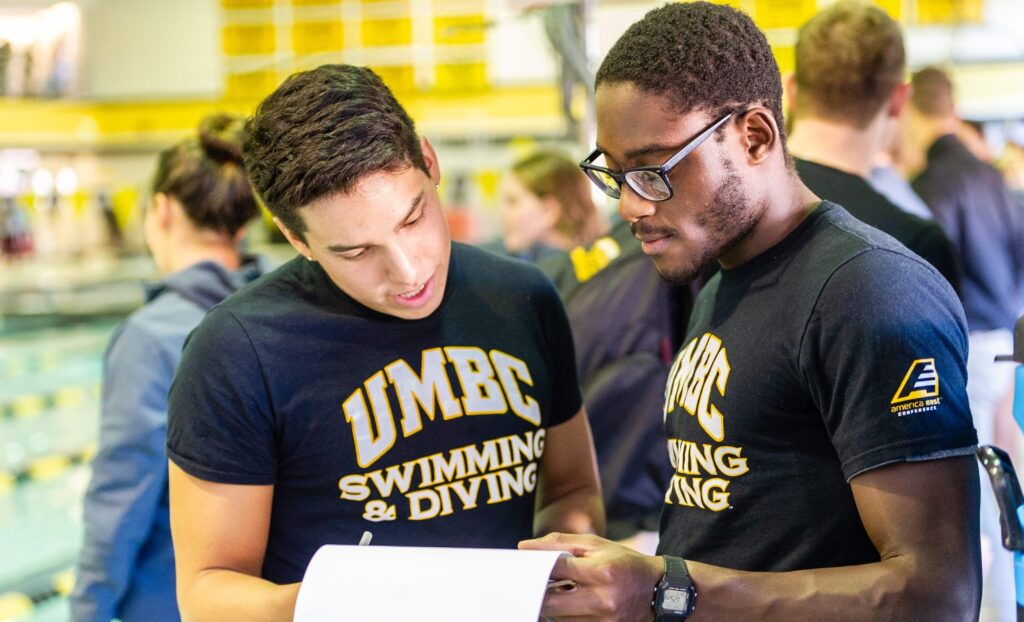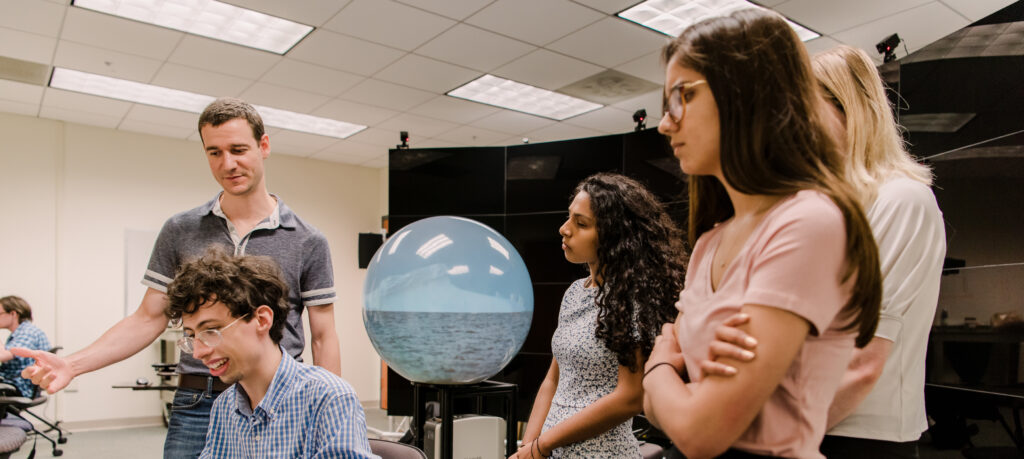What if I told you a story? Would you listen? Over the last year and a half, as the world has faced major social justice and environmental issues, many people have questioned their roles in our shared past, present, and future. But, by talking and listening to stories different from our own, we can find a greater understanding of our diverse lives and some answers to challenging issues.
Now in its third year, UMBC’s Interdisciplinary CoLab: Summer Internship has given nine students from a variety of majors an opportunity to have hands-on experience in this type of humanities-based narrative research. Students were divided equally into three public-facing research projects focusing on civil rights, urban forests, and radical literature. Each team created a digital, audio, or print product that fit a specific need of a community or campus partner in real-time. The research was designed to introduce or strengthen students’ ability to collaborate and their story-gathering/telling skills such as archival research, oral histories, and technical writing.
The UMBC Interdisciplinary CoLab program is a partnership between The Provost’s Interdisciplinary Activities Advisory Committee, the Dresher Center for the Humanities, and the Office of Summer, Winter, & Special Programs.

BLM & Civil Rights oral histories
Nancy Kusmaul, associate professor of social work, was excited to hear her students discuss the Black Lives Matter (BLM) movement during the protests about George Floyd’s murder. But something was missing. Students were aware of BLM and the Civil Rights movement but they didn’t seem to see a connection between them. “I knew I had found an opportunity for students to listen to the past to build a link to the present,” shares Kusmaul, who led a CoLab project on these topics. “Because the CoLab experience focuses on our local communities, what better place to start than Baltimore City.”
Deysi Chitic-Amaya ’23, media and communication studies, was drawn to the project because of the focus on the Civil Rights and Black Lives Matter movements in Baltimore. “We can understand the roots of these global movements by learning how they have changed and influenced the lives and work of people in Baltimore’s communities and neighborhoods,” says Chitic-Amaya, who, with other students, spent the summer conducting virtual oral history interviews with community activists.
There were a few roadblocks. Many of the Civil Rights activists had passed away or were not available, but Kusmaul connected with Baltimore County historian Louis S. Diggs, Baltimore radio host Marc Steiner, and members of the grass-roots, member-led Baltimore organization, Organizing Black.
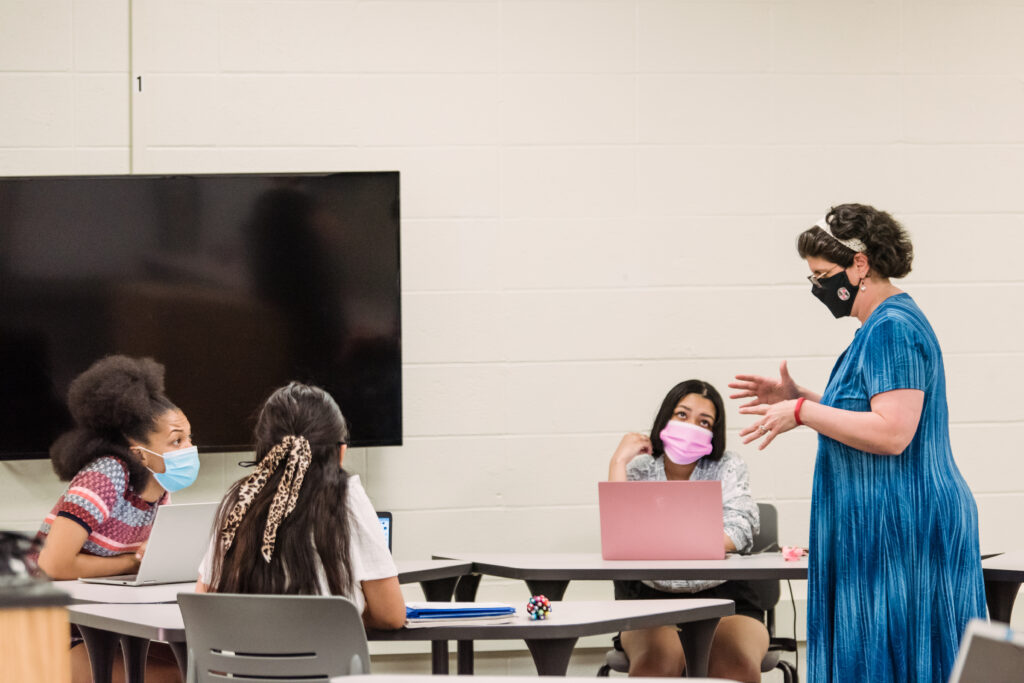
The student researchers learned interview skills using humanities-based research methods. These skills showed them how to listen across differences and how to approach sensitive topics and difficult questions. “I’ve learned how to interview individuals who are different from me whether it be race, gender, age, etc.,” shares Chitic-Amaya.
After the virtual interviews were completed the students transcribed them and deciphered the experiences between the two movements. The oral histories will be added to the Albin O. Kuhn Library Digital Collections with an explanatory essay and a podcast.
“I hope to come away with greater skills in humanities research methods,” says Chitic-Amaya of her time in the CoLab. “I want to be able to approach future projects with a more open-minded perspective that may help to produce something new and innovative.”
Urban forest data stories
Baltimore stories are not only about collecting oral histories. They also include the stories of the green spaces—and the data surrounding them—in and around Baltimore and how those stories shape the way people live and recreate in the city. It can be overwhelming to know where and how to begin or how to improve existing conservation efforts, but for citizen conservationists, wherever they might be, help is on its way.
Led by UMBC’s Jennifer Maher, associate professor of English, the CoLab participants worked in collaboration with the Baltimore non-profit organization Baltimore Green Space to develop a digital and print urban forest health research protocol manual. The manual will be used as a tool to train citizen and professional conservationists.
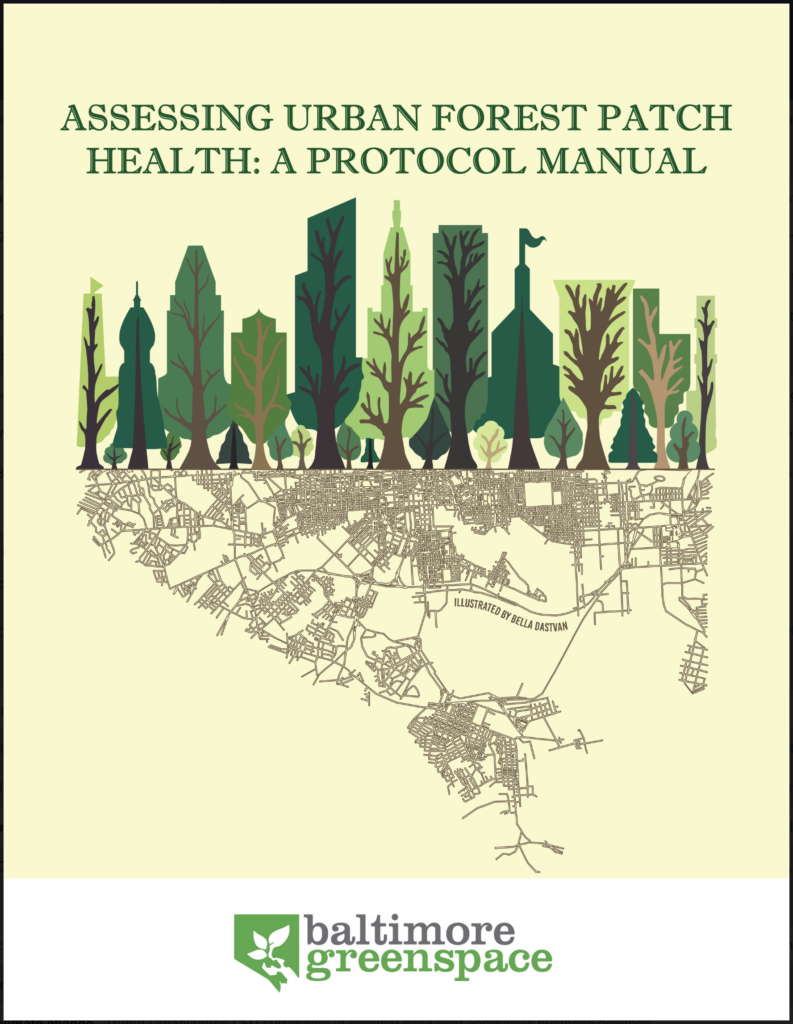
The team jumped right into creating a technical narrative with information about urban forests that was previously gathered by Baltimore Green Space through a collaborative project between Matt Baker, professor of geography and environmental system, the USDA Forest Service, and Johns Hopkins University. Community land stewards, alumni, and current students involved in the Summer Forest Patch Project, a collaborative project between UMBC and Howard County Community College, were also part of the collaboration.
“Technical writing is an occupation that the Bureau of Labor and Statistics identifies as growing faster than average,” explains Maher. “Students were not only helping to foster community-based science and civic engagement in Baltimore and beyond but also gaining marketable skills and professional experience.”
UMBC’s student conservationists learned how to weave data to present a factual and engaging narrative that will train both those already engaged in urban forest health and budding conservationists how to better collect data and share the information with the general public and policymakers. The technical narrative presents the information in a persuasive manner that could encourage more participation in urban health anywhere.
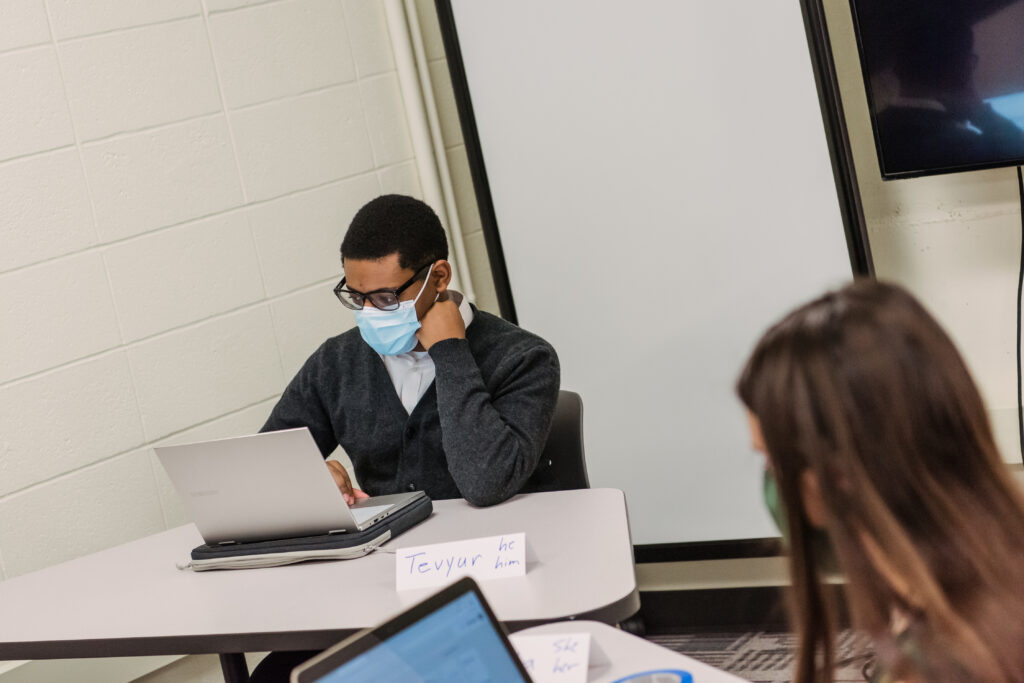
Tevyur Mosley ’22, M30, biological sciences, had a big reveal: “I was introduced to the idea that citizens can engage in community-based research that they can then share with their local officials to influence policy.”
Radical literature multimedia exhibition
Unlike the other CoLabs, the students in the Radical Literature in the First Half of the 20th Century group did not interview people. Instead, they learned to uncover stories hidden in the archives of the Albin O. Kuhn Library & Gallery Special Collections department, studying magazines, pamphlets, and essays that narrate the politics and ideas of the socialist movement.
This was a treasure hunt of sorts. Students sifted through and searched scanned documents for key narratives in order to ultimately design an online exhibition that includes a historical timeline, digital stories, research essays, and a video telling the story of the collection. Kate Drabinski, lecturer of gender, women’s, and sexuality studies, who led the group, said that while completing the program virtually had its challenges, seeing the students learn to collaborate from afar was really rewarding.
“As much as we’ve all been working online over the past year, doing this kind of intensive, daily collaboration was a different beast altogether,” she said. “This posed specific challenges, but also opportunities to learn how to work as a team remotely…and how to work with archival documents to do research, and get others excited about using the collection.”
To provide researchers with different perspectives on the socialist movement, “the collection features works of famous authors such as Friedrich Engels and Angela Davis, as well as many niche pieces from small, politically affiliated publishers and both local and national political organizations,” the students explain in their online exhibit. Now curious minds around the world can also discover the breadth and depth of the archive in a more visual and accessible way.
Learning on the job
The summer CoLab internships are not only an opportunity for students across colleges to develop the social and technical skills of working in interdisciplinary teams, but also to explore different fields. CoLab organizers Carole McCann, special assistant to the provost for interdisciplinary activities, and Donald Snyder, lecturer in media and communication studies, designed the program to have a lasting impact on students’ careers. Through public humanities and social science research methods, students are responsible for projects from conception to completion, strengthening their professional communication and project management skills.
“The CoLab experience is about students gaining professional research experience while learning how to appreciate their own skills and that of others,” says McCann. “They learn to meet the expectations of clients and community partners, to tell effective stories for the general public. And doing all of that in real-time.”
To learn more about the CoLab program, visit https://iaac.umbc.edu/co-lab/.
Photos by Marlayna Demond ’11 for UMBC Magazine.
Tags: CoLab

